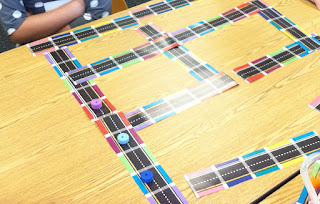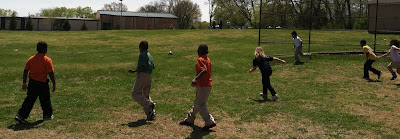I am reading and reflecting on the book The Power of Play by David Elkind.
Chapter 7 - It Isn't Only a Game: The Role of Play in Becoming Social
In this chapter, David Elkind focuses on "middle childhood," that period between early childhood and adolescence. Elkind notes this period is between 6 or 7 and 11 or 12. During this time of life, growth is slower and more gradual than the other two periods before adulthood. Play changes as well. When self-initiated, children play games with rules. These may be more formal games like baseball or basketball; these may be tagging games or racing games or other spontaneous play. It may be board games or elaborate pretend games. But there are rules.
This time of game play with rules is very important. Since they have reached the age of reason, children in this age range understand and explore rules of all kinds. These self-initiated games help kids "learn the interpersonal skills needed to become effective social beings." Kids begin to understand that rules are not immutable but are manmade constructs that can change or adapt. And, often in these games with rules, children will begin to innovate with the rules, adapting or changing the game's rules to modify play.
Playing games with rules becomes a way to explore and understand social institutions. In playing a game, children follow the rules of how to behave in certain circumstances. They must willingly "submit" to the rules of the game to participate. They must subordinate their personal wishes to the will of the group and the rules of the game. (I may not want to stop running when tagged but the game dictates that I must.) These types of behaviors are also required by the social institutions of adults.
David Elkind quotes Piaget: "It is through game playing, that is, through the give and take of negotiating plans, settling disagreements, making and enforcing rules, and keeping and making promises that children come to understand the social rules which make cooperation with others possible."
Elkind also notes other aspects of middle childhood and game play with rules. During this time, a divergence between genders begins. Boys and girls both play and interact more with their own genders and have less contact with the other genders. Interests generally develop for different types of games - boys gravitate toward more rough-and-tumble games and fantasy; girls toward more relationship-building and expressive activities. Elaborate rules about how to interact with the other gender are developed. I remember my second graders noting when someone was "girl trapped" or "boy trapped"; that is, forced to sit between two kids of the opposite gender because the teacher made them. It was only acceptable to sit near a boy/girl when instructed; you couldn't choose to do it.
Games with rules foster both cooperation (working together toward an end goal) and competition (working to improve competence). While both are healthy and necessary, competition can get out of hand and cause breakdown in relationships. Often it's better to foster competition with oneself (improve my own performance). Games and challenges can help kids learn how to develop both of these and adapt themselves to the situation of each one. "Two of the most important social skills that children learn through game play," David Elkind writes, "are socially acceptable forms of cooperation and competition."
Game play in these childhood years helps kids identify with their peers and begin to distance themselves from their parents and other adults. "Self-initiated games with rules play an important role in children's growing sense of self and social awareness." Making and breaking rules, developing independence, working with in a social group - all of these are important ways that games impact children's lives.
Elkind notes that organized sports and activities do not offer the same opportunities as self-initiated games. This reminds me of the importance of recess and unstructured time outdoors after school. As each of these are limited more and more by focus on instruction time and homework, we may be creating groups of kids that are unprepared for playing a part in society. Creating, playing, and modifying games with rules helps children explore and begin to understand how to operate in larger society. If we deny them those opportunities, what kind of society will we have?



